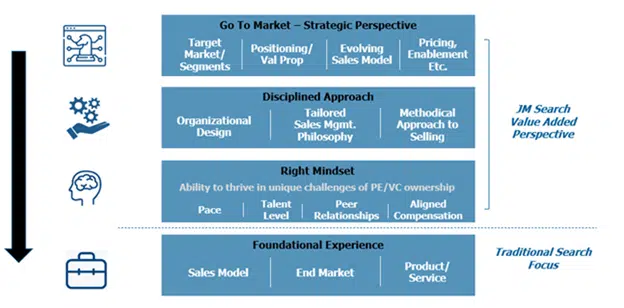Industry: Consumer, Education & Social Impact, Financial Services, Healthcare & Life Sciences, Industrial, Legal, Media, Entertainment & Communications, Services, Technology
Role: Sales & Marketing
Organization: Private Equity
The uncertainties and high costs of inorganic growth strategies have led many private equity investors to shift their focus to organic revenue expansion. As a result, CEOs and their sponsors are abandoning traditional sales leadership positions and embracing revenue-focused roles like Chief Revenue Officer (CRO), Chief Growth Officer (CGO), and Chief Commercial Officer (CCO).
The broad nature of these roles has made traditional search tactics ineffective. Industry experience, sales model expertise, and previous achievements in a specific sector no longer guarantee success in the role. Today’s business environment demands a distinct skill set to drive meaningful growth—skills that many investors often overlook. Recognizing these nontraditional but essential skills can open doors to a wider talent pool, increasing the likelihood of finding the ideal growth-focused revenue leader.
The Traditional Sales Leader Search
In many cases, the focus areas for evaluating CROs, CGOs, CCOs, and other sales executives have remained narrow despite the expanding role requirements. CEOs and investors often evaluate candidates based on three areas to determine who moves forward: Do they get our specific sales model (e.g., direct vs. channel motions)? Do they have deep relationships in our end-markets? Have they sold a heavily related product/service?
While this approach worked well when the scope of these roles was limited to managing a great sales team, it doesn’t hold up when searching for someone capable of handling a more comprehensive role. In today’s PE landscape, foundational experience simply isn’t enough. Unpredictable factors often require leaders to think, act, and lead in ways that deviate from traditional methods.
There are three additional key skill areas that private equity investors must focus on when evaluating a broader sales/revenue leader, highlighted in the graphic below:

Strategic Perspective
Winning new markets demands much more than strong selling skills. Leaders must develop a clear, consistent go-to-market strategy that aligns cross-functional teams to ensure seamless rollout, adaptability, and measurable impact. Key factors include:
- Target Market and Customer Personas—the key buyers within specific verticals most likely to buy the product/service.
- Value Proposition—the defining characteristic of a company’s offering that makes it unique compared to competitors.
- Pricing Model—the cost of the offering, and how the company structures the purchase for each customer base.
- Sales Model—the approach sales teams will use, such as Direct Sales, Channel Partnerships, or Product-Led Growth.
- Demand Generation Strategy—a multichannel approach to marketing that targets key customer bases to increase conversion rates.
- Training/Enablement—educating sales teams on all aspects of the offering, providing key messaging and tactics to aid in the sales process.
Still, it isn’t enough to incorporate these elements into a winning go-to-market strategy—every decision involves trade-offs. For instance, lowering the price of an offering might quickly attract new customers, but could reduce its perceived value and compromise long-term profitability. Sales executives must anticipate these consequences and ensure their approach aligns with the company’s sales objectives.
A Disciplined Approach
It’s incredibly rare for a new sales executive to join a company with a department that runs perfectly. Even successful, high-performing companies have issues or inefficiencies that prevent growth. Yet organizational challenges often attract ambitious leaders who see them as an opportunity to demonstrate their knowledge and abilities.
Because of these challenges, executive sales leaders must be disciplined in numerous aspects of their role to ensure success, including:
- Designing an organizational structure that aligns constrained resources most effectively to address existing and new market segments.
- Implementing repeatable, scalable processes that allow sales leaders to effectively manage their teams, while providing stakeholders with clear insights to drive informed decision-making.
- Establishing a standardized sales pipeline that enables accurate forecasting, streamlines deal progression, and provides visibility into bottlenecks. This structure ensures sales teams operate efficiently while identifying skill gaps for targeted training and coaching.
- Defining essential sales skills to ensure both new and existing employees are fully equipped to meet aggressive growth targets. A structured approach to training and upskilling enables teams to refine weaknesses and stay competitive in evolving market conditions.
The Right Mindset
PE-backed businesses operate much differently than others, and the ideal candidate must be mentally prepared for all that entails. This means adjusting to an accelerated pace of growth aligned with a tight hold period, embracing collaboration with executives across departments, motivating with a performance incentive-heavy compensation structure, and leading a different caliber of talent typically found in classic “blue-chip” organizations.
Executive sales leaders must adapt to the evolving needs of the business, which isn’t always an easy adjustment for those new to private equity. It takes a leader who views these challenges as opportunities, rather than obstacles to success.
A Search Partner for Finding the Right Sales Leaders
Traditional success indicators alone no longer predict whether a sales executive will thrive in their new role. CEOs and investors—whether searching for a new candidate through their own network, internal recruitment processes, or leveraging an executive search firm—must expand their framework to find candidates who can excel in a PE-backed environment.
At JM Search, we have over 40 years of experience working within the private equity ecosystem, closely monitoring the latest trends shaping the executive talent model. For investors who want to land the perfect candidate the first time around, it’s critical to enlist a search partner that understands the unique needs of PE-backed companies.
Is your company searching for a high-performing sales leader? Reach out to our team—we’ll help you find the right fit.
Stay updated on the latest trends shaping the human capital landscape by subscribing to our blog.
Insights in your inbox
Stay up to date on the latest trends and insights shaping the executive search landscape from JM Search’s Blog.

